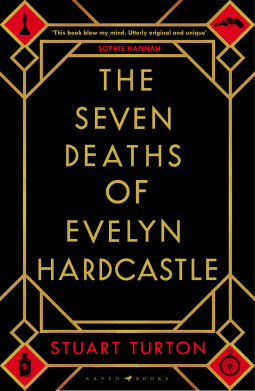
I see that the title changed to THE 7 1⁄2 DEATHS OF EVELYN HARDCASTLE since I added it on Goodreads over a year ago. I can only assume that this change was due to readers confusing this book with the similarly titled THE SEVEN HUSBANDS OF EVELYN HUGO, although apart from their titles and the names of the women in them, the books are as different as night and day.
People were hyping up THE SEVEN DEATHS OF EVELYN HARDCASTLE, as they always do with any title that manages to become a certified Hype Train™, and even though I consider myself "wise" to the shenanigans of influencers and targeted marketing, when you see everyone and their technologically literate grandmother saying, "OMG, this is the best thing since sliced bread," you can't help but feel a major case of FOMO. Sometimes Hype Trains™ are exciting, and take you to exactly where you want to go - and beyond. And sometimes, Hype Trains™ take you to a very different destination than the one you had in mind - and not necessarily in a good way.
THE SEVEN DEATHS (or THE 7 1⁄2 DEATHS depending on which edition you have) combines the premises of the Groundhog's Day movie and turn-of-the-century parlor mysteries in the vein of Agatha Christie. Our hero wakes up confused, remembering nothing. He is in a grand estate, peopled with a number of servants and middling gentry, and one of those people is doomed to die. The hero is doomed to repeat the same day, over and over, jumping from body to body of eight people at the estate, until he can figure out the murderer of the titular Evelyn Hardcastle. If he doesn't, the cycle begins anew, as well as the murders. Obviously, there's a catch - and that catch is that our hero is not the only person who is competing to find out the murderer's identity, and if he doesn't guess quickly enough, he will stay in this tortuous loop forever, gradually losing the dominant aspects of his real personality to those of the hosts he's inhabiting, which feels like a very cruel sort of hell to me.
I've experienced variations on the "loop" concept in stories across several forms of media, some of them done better than others. I think THE 7 1⁄2 DEATHS OF EVELYN HARDCASTLE has a very interesting concept, and the idea of a seemingly omniscient person forcing a group of people (which may include the murderer) to identify the murderer in their midst kind, Clue-style, almost reminded me of one of my favorite childhood books, THE WESTING GAME. THE 7 1⁄2 DEATHS is just as meticulous about the details, and I can only imagine how organized the author had to be to keep everything straight, but when it comes to the plotting, I feel like the book falls short. The author gets lost in his own flowery and self-absorbed writing, which leads to a lot of thoughtful introspection about forgiveness and humanity and punishment, but also means that the plot plods, and at times feels very circular. For large portions of the novel, I was bored, and by the time I realized how bored I was, I was invested enough in the outcome that I felt obligated to read to the end. How annoying.
I have a lot to say about the ending, most of which I won't say anything about because of spoilers. I will say that I feel like the ending jumped the shark and raised more questions than it answered, which is even more annoying, because if you read a book like this to the end it's probably because you want some damn answers. The nebulousness of the main character also made him a difficult person to root for, because I never felt fully invested in him - his personality was so muddled, and he was basically eight different people, and that spreads your sympathies pretty thin, imho. I'm definitely side-eying the reason for the "loop," as well as the more supernatural elements in the book, not to mention the convenience of the footman and the literal deus ex machina that was the doctor (no, not that Doctor). I'm also curious if the author actually believes in this Draconian method of meting out justice, or if this is just a concept piece that he decided to bring to fruition (from his after note in the book, it seems that the answer might be maybe). It was an interesting experiment, but in my opinion, not a particularly successful one.
3 out of 5 stars
No comments:
Post a Comment
Note: Only a member of this blog may post a comment.